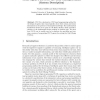127 search results - page 18 / 26 » Programming Rational Agents in a Modal Action Logic |
AAAI
2000
15 years 21 days ago
2000
Just as actions can have indirect effects on the state of the world, so too can sensing actions have indirect effects on an agent's state of knowledge. In this paper, we inve...
AROBOTS
1998
14 years 11 months ago
1998
We describe a uniform technique for representing both sensory data and the attentional state of an agent using a subset of modal logic with indexicals. The resulting representation...
ICMI
2004
Springer
15 years 4 months ago
2004
Springer
One of the implicit assumptions of multi-modal interfaces is that human-computer interaction is significantly facilitated by providing multiple input and output modalities. Surpri...
113
click to vote
CLIMA
2006
15 years 22 days ago
2006
FLUX is a declarative, CLP-based programming method for the design of agents that reason logically about their actions and sensor information in the presence of incomplete knowledg...
ATAL
2005
Springer
15 years 4 months ago
2005
Springer
This paper presents a logic of knowledge, belief and certainty, which allows us to explicitly express the knowledge, belief and certainty of an agent. A computationally grounded m...

